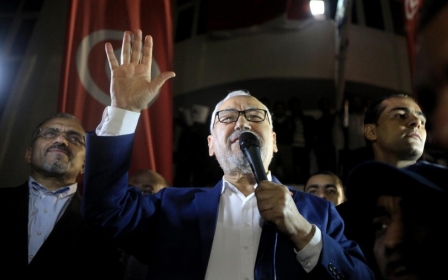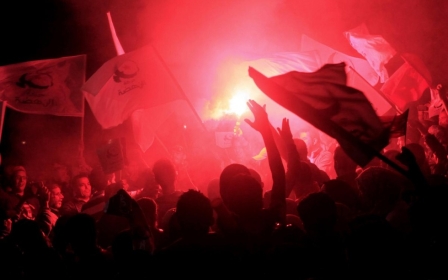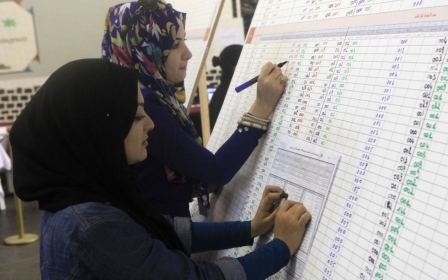Tunisia election results confirm Nidaa Tounes victory

Nidaa Tounes party came top in Tunisia’s landmark legislative polls beating rivals Ennahda, who had already conceded defeat, provisional results released early Thursday showed.
Nidaa Tounes won 85 of the 217 parliamentary seats in Sunday's vote, with Ennahda coming second with 69, the ISIE election body told a press conference.
Neither of the two top parties had been expected to win an outright majority, so political horse-trading had already begun ahead of the announcement of the results.
Ennahda, dominant in Tunisian politics since the 2011 revolution, has won praise for its grace in conceding defeat in the landmark parliamentary elections in the country, which was the cradle of the Arab Spring revolts that shook the wider region.
Just hours after polling stations closed Sunday, Ennahda acknowledged that it had been beaten into second place by Nidaa Tounes.
Ennahda, which steered the North African nation through the aftermath of the revolution, congratulated Nidaa Tounes for becoming the largest party in the first parliament to be elected since then.
The movement called on its supporters to celebrate "democracy" and hundreds of them rallied outside its Tunis headquarters despite the defeat.
"We consider Tunisia has triumphed and that Ennahda has triumphed by leading the country to this stage," said Abdelhamid Jelassi, national coordinator for the movement, whose campaign slogan was "consensus".
Independent analyst Selim Kharrat, said this has made Ennahda look like"a very sleek, very democratic party, which congratulates its opponent, which hands over power", also referring to January, when Ennahda gave way to a government of technocrats to defuse a political crisis.
The UPL (Free Patriotic Union), led by entrepreneur Slim Riahi, came third, winning 16 seats.
That was just one more than the leftist coalition Popular Front secured.
Tunisians hope the election, and the presidential vote on 23 November, will provide much-coveted stability, nearly four years after the January 2011 revolution that toppled longtime president Zine El Abidine Ben Ali.
Nidaa Tounes, an eclectic coalition of left and centre-right figures, opponents and former bigwigs of the ousted Ben Ali regime, mounted a strong campaign against Ennahda .
Ennahda, which won Tunisia’s first free elections three years ago after the toppling of Ben Ali, had previously been accused of working to Islamise society away from its traditional secularism.
Tunisia’s economy has also been in the doldrums during its tenure, and two prominent figures were assassinated last year by suspected militants, triggering the political crisis that Ennahda resolved by handing over power.
Analyst Slaheddine Jourchi said Ennahda's change of tack could be traced back to the Egyptian army's ouster of Islamist president Mohamed Morsi in July 2013 and the bloody repression that followed.
"What happened in Egypt shook them up" and led to an easing of strains with Nidaa Tounes.
Analyst Kharrat said this showed Ennahda's "extraordinary pragmatism and capacity to adapt" to political developments.
Grand coalition
Under Tunisia’s electoral system, a party that gains the largest number of votes but falls short of an outright majority is given a mandate to form a coalition government.
Tunisian newspapers on Wednesday predicted a grand coalition.
"The best scenario would be a Nidaa Tounes-Ennahda coalition guaranteeing a stable government for the next five years," said the French-language daily La Presse.
Foreign observers praised the "free" election and signs of a peaceful transition in the birthplace of the Arab Spring.
In other countries, the hopes of the Arab Spring uprisings have given way to conflict or renewed repression.
However, poverty and unemployment, which were key factors that sparked the anti-Ben Ali revolt, remain unresolved.
Nidaa Tounes leader Beji Caid Essebsi, an 87-year-old veteran of Tunisian politics, vowed to form a coalition with other parties to take the country forward.
"We took the decision in advance that Nidaa Tounes would not govern alone, even if we won an absolute majority," Essebsi told Al-Hiwar Al-Tounsi television.
"We will govern with those closest to us, with the democratic family, so to speak," he said.
Essebsi has also said he will stand in the 23 November presidential election, and is considered to be a front-runner.
Ongoing violence
New MEE newsletter: Jerusalem Dispatch
Sign up to get the latest insights and analysis on Israel-Palestine, alongside Turkey Unpacked and other MEE newsletters
Middle East Eye delivers independent and unrivalled coverage and analysis of the Middle East, North Africa and beyond. To learn more about republishing this content and the associated fees, please fill out this form. More about MEE can be found here.




